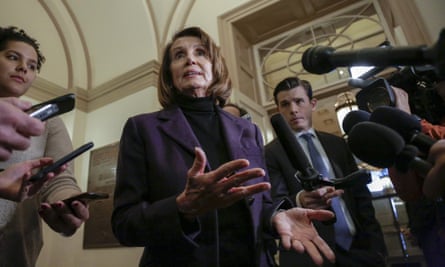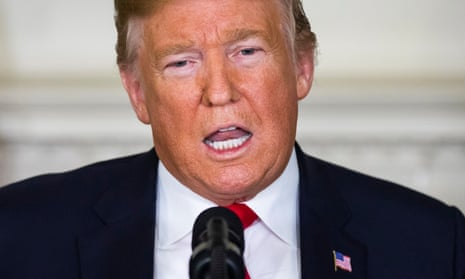Donald Trump forged ahead on Saturday and proposed a deal to end the US government shutdown, despite Democrats having rejected it before he began to speak.
If its timing was striking, the rejection was no surprise. In exchange for temporary concessions on the status of threatened migrant groups, the president doubled down on his demand for a border wall. A senior House Democratic aide told the Guardian the party, which has vowed not to give Trump funding for any wall, was not consulted.
Speaking from the White House, the president outlined a plan that would extend protections for young undocumented migrants brought to the US as children, known as Dreamers, and individuals from some Central American and African nations, in exchange for $5.7bn for a wall on the US-Mexico border.
“A wall is not immoral,” he said, adding: “The radical left can never control our borders. I will never let that happen.”
“As a candidate for president,” he said, “I promised I would fix this crisis, and I intend to keep that promise one way or the other.”
Trump spoke as the partial shutdown of the federal government, the longest in US history, rolled through its 29th day. Prompted on 22 December over Trump’s demand for a wall, the partial closure of departments and services has left around 800,000 federal workers without pay. Hundreds of thousands of contractors are also going without a check.
Before the president took the podium, House speaker Nancy Pelosi panned his proposal.
“Democrats were hopeful that the president was finally willing to re-open government and proceed with a much-need discussion to protect the border,” she said in a statement.
“Unfortunately … his proposal is a compilation of several previously rejected initiatives, each of which is unacceptable and in total do not represent a good faith effort to restore certainty to people’s lives. It is unlikely that any one of these provisions alone would pass the House, and taken together, they are a non-starter.”
Democrats put forward their own offer: $1.3bn in border security funding and hundreds of millions for immigration judges and improving ports of entry.
They also pointed out that the White House was not embracing a permanent solution for Dreamers, from whom Trump rescinded protections in 2017, but offering only three years in which they could obtain work permits and not fear deportation.
Trump’s plan would also allow those with “Temporary Protected Status”, a program for migrants from countries afflicted by violence and natural disasters, to remain in the US. The fate of hundreds of thousands of TPS holders from El Salvador, Haiti, Nicaragua and Sudan, the subject of Trump’s infamous alleged remark about “shithole countries”, has been left uncertain after the president moved to terminate their status.
Republican leaders threw their support behind Trump. Senate majority leader Mitch McConnell announced plans to move corresponding legislation next week.
“Everyone has made their point – now it’s time to make a law,” he said in a statement issued as Trump wrapped his speech in the Diplomatic room of the White House, following symbolic participation in a naturalization ceremony for new US citizens.
“The situation for furloughed employees isn’t getting any brighter and the crisis at the border isn’t improved by show votes,” McConnell said. “But the president’s plan is a path toward addressing both issues quickly.”
The move was designed to build pressure on Democrats in the House, who have spent two weeks passing bills that would reopen the government one department at a time but did not include money for a wall.
McConnell has refused to bring any of those bills up for a vote, even as several polls show a majority of the public blames Trump for the shutdown and disagrees with his insistence on a wall.
The House Democratic aide who spoke to the Guardian indicated that McConnell’s bills will not pass, saying: “The president must agree to reopen government and join Democrats to negotiate on border security measures that work, and not an expensive and ineffective wall that the president promised Mexico would pay for.”
Trump campaigned on a promise to build the wall with concrete and have Mexico pay for it. He said again on Saturday he now wants sections of “see-through” wall made of steel slats. He claims Mexico will still pay, thanks to an as yet unratified trade deal. That claim is widely contested.

On Saturday, Trump faced pushback from some of his most ardent supporters, who decried his offer as “amnesty” for undocumented migrants.
“100 miles of border wall in exchange for amnestying millions of illegals,” far-right commentator Ann Coulter tweeted. “So if we grant citizenship to a BILLION foreigners, maybe we can finally get a full border wall.”
The anti-immigration group NumbersUSA dismissed Trump’s plan as “a loser for the American workers who were central to his campaign promises”.
“This kind of amnesty deal will incentivize more caravans, more illegal border crossers and more visa overstayers at the expense of the most vulnerable American workers who have to compete with the illegal labor force,” group president Roy Beck said in a statement.
Trump tried to frame his proposal as an attempt to “break the logjam”, adding: “Both sides in Washington must simply come together.” But the shutdown is the third on his watch.
Many federal workers and contractors affected have said they are struggling to pay for everyday items, some forced to choose between mortgages and other bills. Key government services, including air travel security, food and drug inspections and nutritional assistance, are inoperative or facing mounting problems.
Republicans initially backed a compromise that would have funded the government and punted a broader debate to February. Trump signaled he would sign such a bill, then abruptly changed course.
Some analyses suggest a wall would do little to curb illegal immigration, the rate of which has fallen sharply over the past decade.
